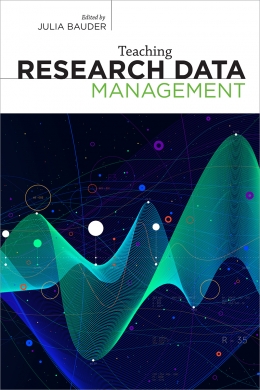
Primary tabs
You don't need to be an ALA Member to purchase from the ALA Store, but you'll be asked to create an online account/profile during checkout to proceed. This Web Account is for both Members and non-Members. Note that your ALA Member discount will be applied at the final step of the checkout process.
If you are Tax-Exempt, please verify that your account is currently set up as exempt before placing your order, as our new fulfillment center will need current documentation. Learn how to verify here.
- Description
- Table of Contents
- About the author
- Reviews
Armed with this guide's strategies and concrete examples, subject librarians, data services librarians, and scholarly communication librarians will be inspired to roll up their sleeves and get involved with teaching research data management competencies to students and faculty.
The usefulness of research data management skills bridges numerous activities, from data-driven scholarship and open research by faculty to documentation for grant reporting. And undergrads need a solid foundation in data management for future academic success. This collection gathers practitioners from a broad range of academic libraries to describe their services and instruction around research data. You will learn about such topics as
- integrating research data management into information literacy instruction;
- threshold concepts for novice learners of data management;
- four key competencies that are entry points for library-faculty collaboration in data instruction;
- an 8-step plan for outreach to faculty and grad students in engineering and the sciences;
- using RStudio to teach data management, data visualization, and research reproducibility;
- expanding data management instruction with adaptable modules for remote learning;
- designing a data management workshop series;
- developing a research guide on data types, open data repositories, and data storage;
- creating a data management plan assignment for STEM undergraduates; and
- data management training to ensure compliance with grant requirements.
Introduction by Julia Bauder
Part I Teaching Research Data Management in the Classroom
Chapter 1 Pieces of the Whole: Using the Research Process to Integrate Data Management and Information Literacy Skills
Patricia B. Condon, Megan Bresnahan, and Eugenia Opuda
Chapter 2 Research Data Management Needs of Music Graduate Students
Stacy Winchester and Ana Dubnjakovic
Chapter 3 Research Data Management Instruction in Undergraduate Research Programs: Case Studies
Laura Palumbo
Part II Teaching Research Data Management as Data Information Literacy
Chapter 4 Disciplinary Data Literacy: Expanding on What Instructors Already Teach
Kay Bjornen, Megan Carlton, and Jacinta Mutambuki
Chapter 5 Data Literacy on Demand: Creating a Set of Data Literacy Modules for Remote Instruction
Ginny Boehme, Kristen Adams, and Matt Benzing
Chapter 6 Leveraging the Utility of RStudio to Teach Data Management, Data Visualization, and Research Reproducibility
Briana Wham
Part III Teaching Research Data Management as an Aspect of Data Science
Chapter 7 Building Data Science and Data Literacy Communities of Practice at Academic Libraries
Daniel Chen, Jonathan S. Briganti, and Anne M. Brown
Chapter 8 Complementary Scales for Learning: The Feedback Loop between Short-Form Technical Workshops and Long-Form Carpentries Workshops
Karl Benedict and Jonathan Wheeler
Part IV Outreach and Capacity-Building for Research Data Management Instruction
Chapter 9 Creating Capacity for Research Data Services at Regional Universities: A Case Study
Omer Farooq, Jason A. Heppler, and Kate M. Ehrig-Page
Chapter 10 Expanding Research Data Management to UC Berkeley Researchers: A Targeted Approach to Outreach and Instruction
Amy Neeser, Anna Sackmann, Samantha Teplitzky, Ann Glusker, and Elliott Smith
Chapter 11 Teaching Data Management Concepts to Research Administrators
Nicholas Ruhs, Jesse Klein, and Renaine Julian
About the Contributors
Index
Julia Bauder
Julia Bauder is the Social Studies and Data Services Librarian at the Grinnell College Libraries. She has written or edited several books, including The Reference Guide to Data Sources, Data Literacy in Academic Libraries: Teaching Critical Thinking with Numbers, and Teaching Research Data Management. She has also published and presented about information literacy, data literacy, and data visualization in venues including Information Technology and Libraries, College & Undergraduate Libraries, and the LITA National Forum.
"Particularly useful is Briana Wham's essay on RStudio—which is omnipresent in research communities, so teaching RDM through an R framework is a logical and enticing approach for students and others. The essay on scales of learning—short versus long technical workshops—is also valuable ... Overall, Bauder's collection offers a good selection of compelling ideas and insights into different areas of RDM, and offers librarians a menu of examples to explore for their own programs."
— Choice
"This work is a great asset for any organization or university in building, refining, and expanding their RDM training programs. There is no one size fits all approach to teaching this subject. However, this work uses the experience of several successful RDM training programs to show how each program tailored their programs to meet institutional needs. This should be on the shelf of every research administrator, research executive, university faculty of graduate level programs, library director, and RDM training staff members. This reader highly recommends this title. "
— Journal of Hospital Librarianship


